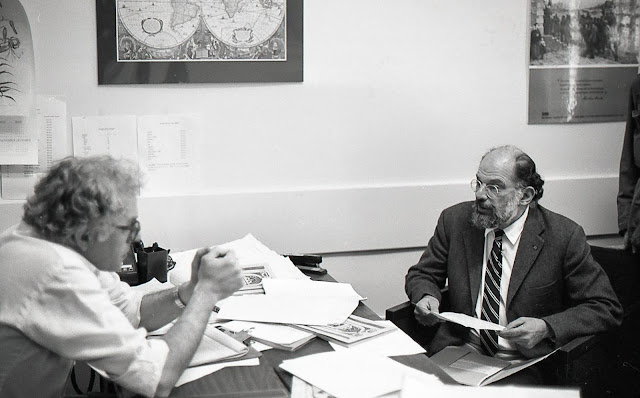[Angel Playing Lute - detail from Presentation of The Temple (1510) - Vittore Carpaccio (1466-1525) at the Accademia, Venice, Italy)] AG: So what's next? - Another funny thing.. Well, there's some (Sir Thomas) Wyatt here. Let's just take one bit - a fast-forward look at Wyatt, find something of Wyatt that sounds good, way on ahead (rustling through anthology) but Wyatt is what? seventeenth-century? - Page 150? - 115 - yeah - no, he's much earlier. We'll get to Wyatt later. I just wanted to find one sing-song poem of Wyatt's… Well, for his.. for a.. that same tetrameter, iambic tetrameter - "My Lute Awake" page 117 (which I'll read aloud in sing-song, because Wyatt is one of the most brilliant sing-song metric masters - he sort of perfected it, I think,and is, for me, almost the ideal, acme. It influenced a lot of my early poetry because it was such strong sing-song, that was like real clear to the ear, real precise and clear to the ear. So I found him immediately.. I found myself immediately attracted to his rhythms because they were so perfect and so clear, and once in a while there'd be something I would stumble on and I'd finally unravel it and figure out what accent he had, it would fall into place so smoothly, I realized what a strange genius he was for that sing-song.
My lute awake! perform the lastLabour that thou and I shall waste,And end that I have now begun; For when this song is sung and past,
My lute be still, for I have done.
As to be heard where ear is none,
As lead to grave in marble stone,
My song may pierce her heart as soon;
Should we then sigh or sing or moan?
No, no, my lute, for I have done.
The rocks do not so cruelly
Repulse the waves continually,
As she my suit and affection;
So that I am past remedy,
Whereby my lute and I have done.
Proud of the spoil that thou hast got
Of simple hearts thorough Love's shot,
By whom, unkind, thou hast them won,
Think not he hath his bow forgot,
Although my lute and I have done.
Vengeance shall fall on thy disdain
That makest but game on earnest pain.
Think not alone under the sun
Unquit to cause thy lovers plain,
Although my lute and I have done.
Perchance thee lie wethered and old
The winter nights that are so cold,
Plaining in vain unto the moon;
Thy wishes then dare not be told;
Care then who list, for I have done.
And then may chance thee to repent
The time that thou hast lost and spent
To cause thy lovers sigh and swoon;
Then shalt thou know beauty but lent,
And wish and want as I have done.
Now cease, my lute; this is the last
Labour that thou and I shall waste,
And ended is that we begun.
Now is this song both sung and past:
My lute be still, for I have done.
That's so pretty. That regularity (and what variations there are) and once you understand where to lay your accent .
Another similar(ly) perfect by Wyatt is "Forget Not Yet..", which I think is a variant, using.. I guess some suggestion from old Greek prosody (Sapphic or Alcaic), where you have this little tag line at the end, three lines and a tag line that echoes and repeats and isn't the complete line but just sort of like locks the rhythm in
Forget not yet the tried intent Of such a truth as I have meant;
My great travail so gladly spent,
Forget not yet.
Forget not yet when first began
The weary life ye know, since whan
The suit, the service, none tell can;
Forget not yet.
Forget not yet the great assays,
The cruel wrong, the scornful ways;
The painful patience in delays,
Forget not yet.
Forget not yet, forget not this,
How long ago hath been and is
The mind that never meant amiss;
Forget not yet.
Forget not then thine own approved,
The which so long hath thee so loved,
Whose steadfast faith yet never moved;
Forget not this.
It's pretty funny because all the little simple syntax words - the "this", the "that", you know, going back and forth - "Forget not yet", "Forget not this", "How long ago", "and is" - just the funny little syntactical tricks he pulls, just to get.. getting right into the rhythmic perfect thing.
[Audio for the above can be heard here, beginning at approximately twenty-nine minutes in and concluding at approximately twenty-nine minutes in]




























































